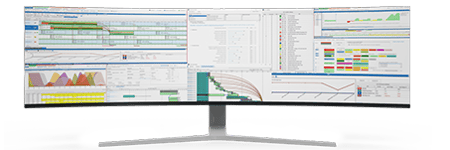The Value of Scenario Planning in Scheduling for Food and Beverage Manufacturing
Operational efficiency is not just a competitive advantage; it’s a survival mechanism. The industry faces a constant balancing act—meeting fluctuating consumer demands, adhering to stringent regulatory requirements, and managing resource constraints. For Operations Directors, the challenge lies in orchestrating these variables into a cohesive production schedule that ensures optimal output without compromising quality or compliance.
One of the most impactful strategies to address these complexities is scenario planning in scheduling. When integrated with advanced tools like PlanetTogether and ERP systems such as SAP, Oracle, Microsoft Dynamics, Kinaxis, or Aveva, scenario planning transcends traditional scheduling methods, offering manufacturers a way to anticipate, adapt, and thrive in an ever-changing environment.

What is Scenario Planning in Scheduling?
Scenario planning is the process of creating and analyzing multiple "what-if" scenarios to predict the impact of various operational decisions. In a food and beverage manufacturing facility, this could mean:
Assessing the impact of a sudden spike in demand for seasonal products.
Planning for disruptions like supply chain delays or equipment breakdowns.
Evaluating the feasibility of introducing a new product line alongside existing operations.
Unlike static scheduling approaches, scenario planning leverages dynamic modeling to simulate potential outcomes, enabling data-driven decision-making.
When integrated with tools like PlanetTogether, scenario planning becomes a cornerstone of effective scheduling, bridging the gap between strategic objectives and operational realities.
![]()

Integrated Systems in Scenario Planning
Enhancing Data Connectivity with ERP Systems
Integration between PlanetTogether and ERP systems such as SAP, Oracle, Microsoft Dynamics, Kinaxis, or Aveva ensures seamless data flow across the organization. This connectivity is critical for scenario planning as it provides:
Real-time Visibility: Access to up-to-date information on inventory levels, production capacities, and supply chain statuses.
Data Consistency: A unified source of truth that minimizes errors caused by manual data entry or siloed systems.
Rapid Response Capabilities: The ability to quickly adapt to changes, thanks to synchronized data and automated workflows.
For example, if a supplier delay impacts the availability of a key ingredient, the integrated system can instantly update production schedules, allowing Operations Directors to evaluate alternative scenarios and implement the most efficient solution.
Advanced Analytics and Predictive Modeling
With advanced scheduling platforms like PlanetTogether, scenario planning is augmented by analytics and predictive modeling. These tools enable Operations Directors to:
Analyze historical data to identify trends and patterns.
Use machine learning algorithms to predict potential disruptions.
Model the impact of various scheduling decisions on KPIs such as cost, productivity, and customer satisfaction.
When paired with ERP systems like Kinaxis or Aveva, these capabilities are further enhanced by robust supply chain data, offering a holistic view of the production ecosystem.

Key Benefits of Scenario Planning in Food and Beverage Manufacturing
Improved Agility and Responsiveness
The food and beverage industry is inherently volatile, with demand fluctuations driven by factors such as seasonality, consumer preferences, and market trends. Scenario planning empowers Operations Directors to:
Quickly model and implement alternative schedules in response to unexpected changes.
Mitigate the impact of disruptions by identifying contingency plans in advance.
Adapt to regulatory updates without halting production.
For instance, during a sudden surge in demand for plant-based beverages, a manufacturer can use scenario planning to reallocate resources, prioritize production lines, and meet market demand without incurring excessive costs.
Optimized Resource Utilization
Efficient use of resources—raw materials, labor, and equipment—is crucial for maintaining profitability. Scenario planning helps manufacturers:
Identify bottlenecks and optimize production flow.
Reduce waste by aligning production schedules with demand forecasts.
Ensure equipment maintenance schedules are integrated into production plans to minimize downtime.
By integrating PlanetTogether with ERP systems like SAP or Oracle, Operations Directors can leverage detailed resource data to create realistic and efficient scenarios that maximize output.
Enhanced Collaboration and Decision-Making
Scenario planning fosters collaboration across departments by providing a shared platform for evaluating options and aligning goals. With integrated systems, teams can:
Share insights and recommendations based on real-time data.
Evaluate the financial impact of various scenarios to align with budget constraints.
Make informed decisions that balance short-term needs with long-term objectives.
For example, integrating PlanetTogether with Microsoft Dynamics enables production, procurement, and finance teams to collaborate on scheduling decisions, ensuring alignment across the organization.
Proactive Risk Management
In an industry where regulatory compliance and food safety are paramount, scenario planning is a critical risk management tool. Operations Directors can:
Assess the impact of recalls, audits, or regulatory changes on production schedules.
Model scenarios to ensure compliance with safety and quality standards.
Identify vulnerabilities and develop mitigation strategies before issues arise.
By leveraging predictive analytics within PlanetTogether, manufacturers can anticipate potential risks and incorporate preventive measures into their scheduling scenarios.
Implementing Scenario Planning in Your Facility
To fully realize the benefits of scenario planning, Operations Directors should consider the following steps:
Invest in Integrated Systems: Ensure seamless integration between your scheduling platform (e.g., PlanetTogether) and ERP systems like SAP, Oracle, Microsoft Dynamics, Kinaxis, or Aveva.
Leverage Advanced Analytics: Use data-driven tools to model scenarios, predict outcomes, and measure performance against key metrics.
Foster a Culture of Collaboration: Encourage cross-functional teams to participate in scenario planning, ensuring alignment and buy-in across departments.
Continuously Refine Models: Regularly update scenarios based on new data, industry trends, and organizational goals.
Scenario planning is no longer a luxury but a must for food and beverage manufacturers navigating an increasingly complex landscape. By integrating tools like PlanetTogether with robust ERP systems, Operations Directors can unlock new levels of agility, efficiency, and resilience. Whether it's adapting to market shifts, optimizing resources, or mitigating risks, scenario planning provides the strategic foresight needed to stay ahead in a competitive industry.
For those ready to embrace the power of scenario planning, the path forward starts with the right tools and a commitment to data-driven decision-making. The result? A smarter, more agile manufacturing operation poised for success in any scenario.
Are you ready to take your manufacturing operations to the next level? Contact us today to learn more about how PlanetTogether can help you achieve your goals and drive success in your industry.
Topics: PlanetTogether Software, Integrating PlanetTogether, Proactive Risk Management, Optimized Resource Utilization, Food and Beverage Manufacturing, Enhanced Collaboration and Decision-Making, Improved Agility and Responsiveness





















LEAVE A COMMENT